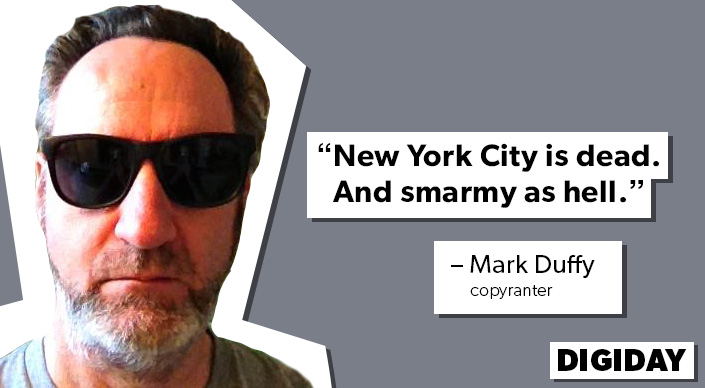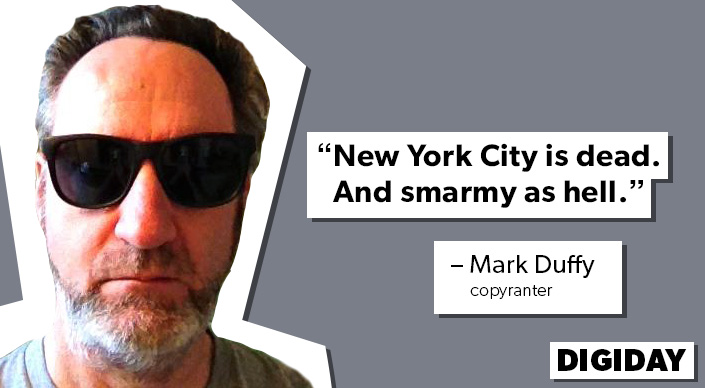Secure your place at the Digiday Media Buying Summit in Nashville, March 2-4
Copyranter: Confessions of an unemployed 54-year-old copywriter

This article is part of our Confessions series, in which we trade anonymity for candor to get an unvarnished look at the people, processes and problems inside the industry. More from the series →
Mark Duffy has written the copyranter blog for 10 years and is currently an unemployed but freelancing copywriter with 20+ years of experience. His hockey wrist shot is better than yours.
The prime adult demographic is 25-54. I am in my last year of mattering, according to the Bureau of Labor Statistics, Nielsen and millions of important and brilliantly crafted marketing decks.
I’ve been unemployed since November 2013, when I was fired from my job as “ad critic” at BuzzFeed.
The first good ad-copywriting freelance gig I got was last fall writing ads and a mailer for an Australian funeral home chain Just Cremations — the subject of one the few positive posts I did while at BuzzFeed. I got this work exactly one month after we cremated my dad after he died of multiple myeloma. Good fucking times, 2014 was.
So if you want confessions of an old ad guy, here we go:
I’ve applied to a few big media websites to work in their “creative studios.”
One person wanted me to first take an edit test. I replied — channeling high school dropout Ed McCabe — that they, conversely, should take a creative test, considering their site’s shit-awful native ad content. This advice wasn’t well received.
I also met with a studio “creative director” over lunch to — I thought — talk about a possible job. Ends up, he just wanted to meet Copyranter, the man who wrote the weekly “Lies Well Disguised” column for Gawker, the reason he said he got into advertising. Hey, thanks for the lunch and compliments and for wasting my fucking time, junior.
I even applied for a job as a “creative” at BuzzFeed. Still waiting to hear back…
I’ve yet to see any examples of good “native” advertising.
Not one. Everybody is doing it exactly wrong. Everybody is underestimating the intelligence of the consumer for the sake of metrics. Which is sad as hell.

I’m fucked, because of my loyalty. And my age.
My portfolio? It’s good, not great, because I’m a good, not great, copywriter. I know this because the small agency I worked at for 19 straight years (yeah, process that industry anomaly) often used freelancers for pitches, so I got to compare my work on assignments directly with that of some of the better-hired gun teams in New York City. Mine was better about half the time.
But my good stuff is 10-15 years old, which is “fucking forever ago” in the ad world. And since I’ve only worked at that one small NYC agency, I have zero good contacts in the city ad business clusterfuck.
I’m scared.
I’m seriously afraid that no one wants to hire an over-50 copywriter, regardless of salary. But I have no other job options, no other experience. How the fuck did I get to be 54 goddamn years old? Does this look 54 to you? Yet, I’m still 10 years away from Social Security! I cry, occasionally. I’m not looking for empathy, I’m just confessing. Derision is OK.
I am, generally, not fond of this generation.
I so miss 1990s New York City. 2015 NYC is dead, and smarmy as hell.
New York millennials are, generally, ageist know-it-alls. I learned this during my 18 months as BuzzFeed’s oldest employee (by a country mile). “Experience” means nothing to many of them — they can just “experience” everything on the Web! And the millennial ad creatives, as a class, are, generally, unimpressive. All execution, few original ideas. Yes, I realize this is not a good job-searching attitude in 2015, but as they would write: IDGAF.
Did I write this post, partially — OK, mostly — as a lame passive-aggressive attempt to get myself hired?
Yes.
More in Marketing

Thrive Market’s Amina Pasha believes brands that focus on trust will win in an AI-first world
Amina Pasha, CMO at Thrive Market, believes building trust can help brands differentiate themselves.

Despite flight to fame, celeb talent isn’t as sure a bet as CMOs think
Brands are leaning more heavily on celebrity talent in advertising. Marketers see guaranteed wins in working with big names, but there are hidden risks.

With AI backlash building, marketers reconsider their approach
With AI hype giving way to skepticism, advertisers are reassessing how the technology fits into their workflows and brand positioning.





